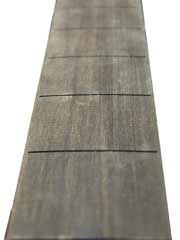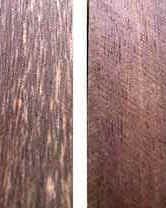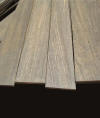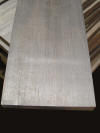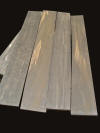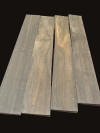EBONY FINGERBOARDS
HOME ORDER ONLINE PRODUCTS REGISTER CONTACT US
Ebony Fingerboards
Click on Part ID to add to shopping cart PART No. Description Price Ea. 6 - 12 Black and quartered, about 21" X 2-5/8" $30.00
—
Out of Stock *May be blackish and may be quartered, about 21" X 2-5/8" $20.00
$18.00
—
*Standard, quartered or slab, about 21" X 2-5/8" $14.50
$14.00
WFE2 *2nd grade, a little of everything, but usable $9.50


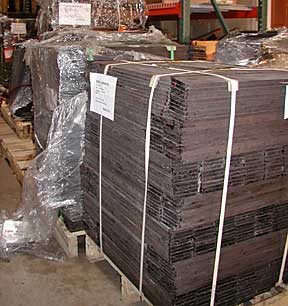
Left, Madagascar ebony just arrived (2004) and awaiting grading. Below, African ebony with its typical mottled grain.


Below, Madagascar ebony (pre-ban), slotted and ready to glue to the neck shaft.
Below, both quartersawn, and both African ebony, the two fingerboards give you an idea of the range in ebony. *Update: 4/19/2013
With the latest shipment of ebony that has arrived, we may be seeing the new paradigm. This is ebony from Crelicam, the Camaroon mill that Taylor and Madinter operate together. Their efforts are focused on producing sustainable and long-term supplies of ebony. To make it all work, we have to use much of the ebony that has been discarded in the past. This roughly translates for us (a supplier) as buying a mixed grade of ebony at one price. The standard sized fingerboard runs about 21" X 2-7/8" X 1/4" sanded both sides. The boards are fixed (meaning all pin-holes, or worm holes are filled) and they are dried, and ready to use.
We received no fingerboards that we would grade as 4A. 3A grade is a broader category (trending downward) than before. We still look for quartersawn fingerboards, evenness in color and texture, and avoid knots. However, a fingerboard that may be blacker, may not be as well quartered as we'd like, or a lighter shade may be better quartersawn and straighter-grained. The photos below probably tell the story best. In general, prices are up a little while quality is down.
We are still working on a source from SE Asia that is very promising, the best ebony we've ever seen, but until the wood's in the warehouse, it's really just so much chin music.
Below, examples of the new 3A grades. Thumbnails, click to enlarge. Below, SE Asian ebony, fine-grained and -textured, non-porous, and black. We'll keep our fingers crossed
Below, examples of the new 2A grades.
Below, examples of the new 2nd grades. Ebony
Diospyros ebenum is one among many of the ebonies used for guitar fingerboards. There are over 400 varieties of ebony in the world, including our own American ebony, persimmon. Most species are shrubs rather than trees, and although there is plenty of ebony in the world, there are not plentiful supplies of fingerboard yielding trees. Those trees that are available are getting smaller, and the quality is lower yet expectations are as they have been since about 1988 when Madagascar ebony became available.
Before Madagascar ebony became available, the industry used primarily Indian and Sri Lankan ebony. Indian ebony was less stable, and not that black, and Sri Lankan ebony often had mineral deposits in it, although occasionally one could find excellent fingerboards from Sri Lanka.
Ebony in Madagascar is no longer easy to get. The price of clove and nutmeg are high enough that the local tree scouts are barely interested in looking for trees, and what they do find the quality is often so that their efforts yield very little recompense.
In short, we should probably brace ourselves for the pre-Madagascar ebony days. It's not a bad idea to inform your customers that if they want black ebony, it may have to be dyed, or oiled, or that they should learn to appreciate the look of wood.
Having said that, at the moment we offer African, Madagascar and Indian ebony. Among all these ebonies the quality varies considerably. African ebony is preferred by the Spanish builders because it's said to be easier to hand plane (although it appears to be more brittle), and it's more stable. They don't mind darkening the fingerboard a little to make it black. Madagascar ebony is usually more dense, and less stable, and not as often quartersawn, sometimes because it's so black it's difficult to see how to cut it (and it's now unavailable. Indian ebony is somewhat sustainable as its leaves are used as a sort of tobacco. It's a better wood for certain things like binding, because its grain is not as interlocking as either the African or the Madagascar ebonies.
Grades
4A grade boards are for retail only. We're simply not getting enough of the quality that everyone wants: black, quarter-sawn, straight grain, and no knots. At best, this grade represents about 10% of what we get. 4A grade boards are quartersawn, even colored, not necessarily black-black, no knots, straight, and fine grained. 3A boards are similar in color to 4A grades, but may have a blemish on one side, or may be slab sawn. If slab sawn, the color will be dark. This grade may have some mineral which can be removed using muriatic acid (recently heard lemon juice works, too).* 2A grade boards are usable, but not great, and will usually require some dying or staining, or if not, may have some knots that go all the way through the board. 1A, for all intents and purposes is really 2nd grade. The most you can say about these boards are that they are ebony. But if you don't mind staining, and perhaps even filling a few blemishes these boards are usable.
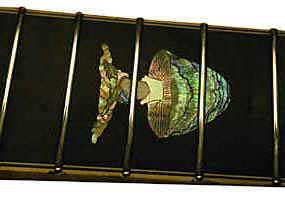
Larry Robinson inlay
*When close to final finishing of the fingerboard, paint on a little Muriatic acid (or glacial acetic acid) with a brush and watch it attack the calcium carbonate. Wipe it off with a paper towel, and apply again. Continue until it's all gone, and then sand to final finish.
Address General Information Sales/support Telephone:
707-431-3760 POB 217, 101 C Grant Avenue, Healdsburg, Ca. 95448 USA info@alliedlutherie.com sales@alliedlutherie.com Fax:
707-431-3762
